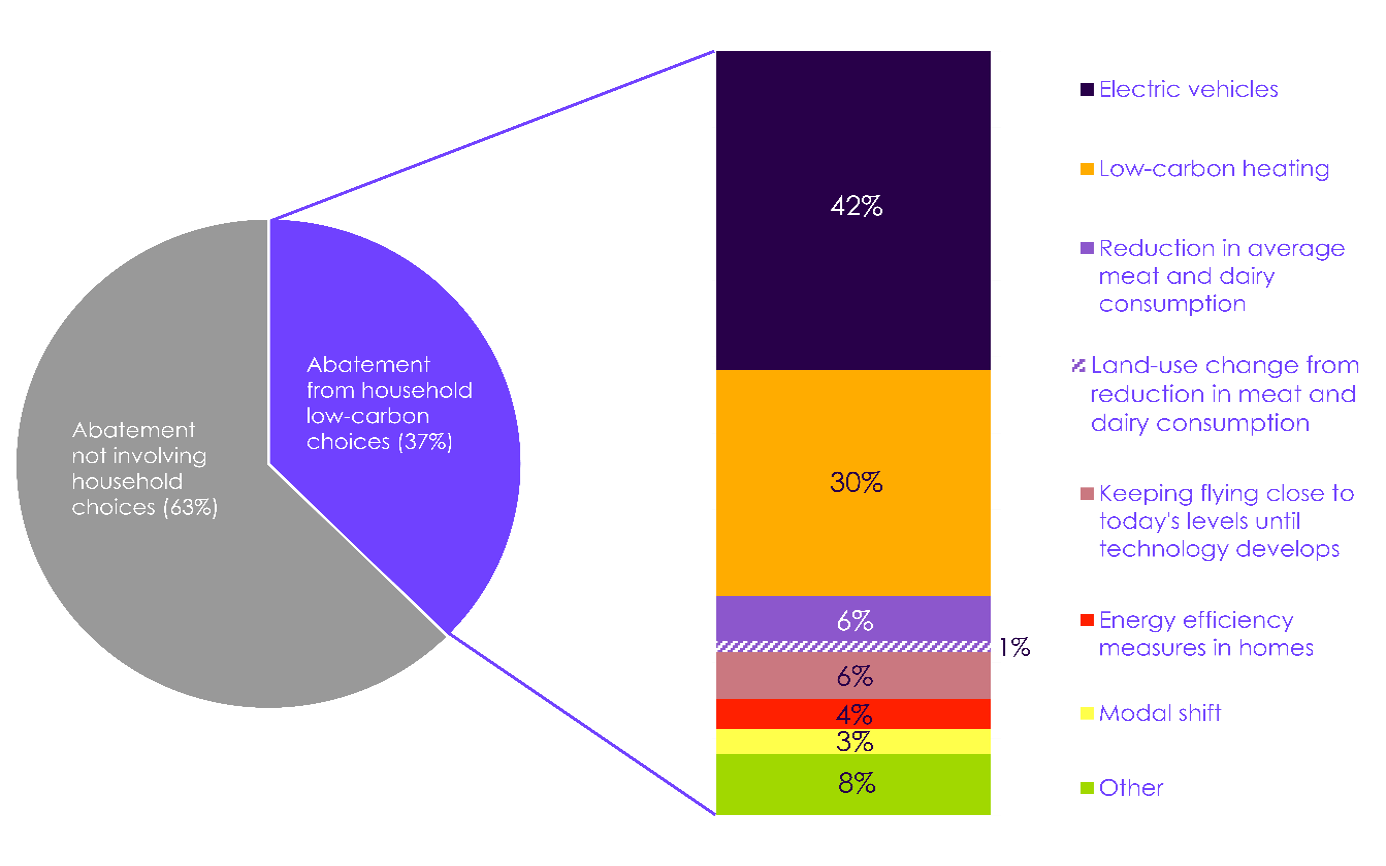Critical Ingredient in Climate Change Committee’s Net Zero Recipe: The Food System
The UK's path to Net Zero is gaining momentum through technological transformation - electric vehicles replacing petrol cars, heat pumps taking over from gas boilers, and renewable energy steadily displacing fossil fuels. Yet amid this wave of innovation, we're overlooking a crucial ingredient in our climate solution recipe: the food on our plates.
The food, farming and wider land use system in the UK is responsible for about 130 million tonnes of CO2e pa, or about 30% of the UK’s territorial emissions.
Small Numbers, Big Impact
According to the UK Climate Change Committee's Seventh Carbon Budget, dietary shifts are expected to contribute just 2% of the total emissions reductions needed over the next 25 years for the UK to become Net Zero. At first glance, this figure seems negligible compared to the dramatic impact of ‘behind the scenes’ electrification.
Figure 8.1 Emissions reduction in 2040 that relies on household low-carbon choices
But this statistic masks a deeper truth: while we have clear technological pathways to decarbonise transport and energy systems, and the food system will benefit from these reductions too, dietary shifts are a crucial, but challenging part of the UK’s decarbonization pathway.
Challenging because unlike the binary swaps of EVs for petrol cars or heat pumps for gas boilers, our food system is a complex web of supply chains, rural communities, cultural preferences, economic structures, and deeply ingrained habits. This complexity makes meaningful change far more challenging, but no less essential.
Growing in Importance
As other sectors rapidly decarbonise, the relative importance of food system transformation will only increase. While CO₂ emissions from fossil fuels are set to plummet in the coming decades, the methane and nitrous oxide emissions from agriculture will persist (without targeted intervention).
These greenhouse gases cannot be eliminated through clean energy solutions alone, making emissions from our dietary choices an increasingly significant portion of our remaining carbon budget. What seems like a small piece of the puzzle today will become a central challenge tomorrow.
Beyond Carbon: Why Climate Messaging Alone Won't Work
Food is personal. What we eat connects us to our heritage, brings us together in celebration, and forms part of our identity. Farmers, retailers, and consumers all have powerful emotional and economic stakes in maintaining familiar patterns.
This is precisely why tackling dietary change through the narrow lens of carbon reduction is ineffective. People don't choose their baskets or evening meal based on greenhouse gas calculations, and pushing climate messaging in isolation often creates resistance (in all factions with a stake in the food system) rather than engagement.
Reframing the Conversation: Health at the Centre
At Planetary Alliance, we've discovered that the most powerful catalyst for food system transformation isn't climate fearmongering - it's improving human wellbeing.
Globally, poor diet is the leading cause of preventable death causing 1 in 5 deaths. Unhealthy diets also cost us greatly - a figure of £268bn a year in the UK (Food Farming Countryside Commission). Evidence shows us that the same dietary shifts that lower emissions - reducing unhealthy ultra-processed foods, moderating processed and red meat consumption, and embracing plant-rich diets - dramatically improve human health outcomes, including lower rates of obesity, heart disease, type 2 diabetes, and certain cancers.
By making dietary change a health-first movement, we engage people where they care most - their personal wellbeing - and can deliver greenhouse gas reductions as a welcome co-benefit.
Translating Science into Action
This health-centred approach forms the foundation of our work at Planetary Alliance. We bridge the gap between scientific research and practical implementation, helping organisations define and execute strategies that simultaneously improve nutrition, enhance sustainability, and strengthen business performance.
Our role is translating complex science into actionable, pragmatic solutions that work in the real world- for businesses seeking to future-proof their operations, governments designing effective policy, and individuals making daily food choices.
The Path Forward
The UK stands at a critical juncture in its Net Zero journey. While technological innovations in energy and transport continue to accelerate, we now need ever increasing focus on the role of the food system.
The challenge is undoubtedly complex, but so are the rewards. By focusing on the multiple benefits of dietary change - better human health outcomes, biodiversity restoration, and resilient food systems - we can drive meaningful progress.
The transition is already underway. Forward-thinking businesses, investors, and policymakers increasingly recognise that the food system must be central to our climate strategy, not an afterthought. At Planetary Alliance, we're committed to ensuring that food and diet become not just part of the conversation, but foundational to the solutions we build together.
Ali Morpeth + Mike Barry are co founders of Planetary Alliance, an organisation dedicated to transforming our food system by helping organisations implement strategies that simultaneously improve human health, environmental sustainability, and business resilience.

